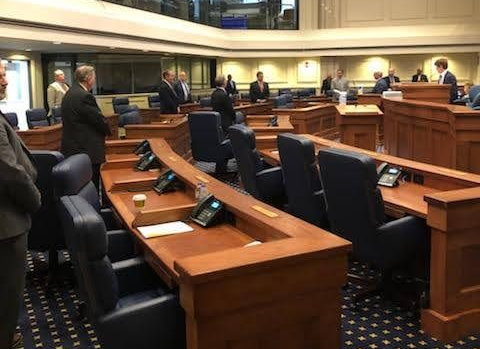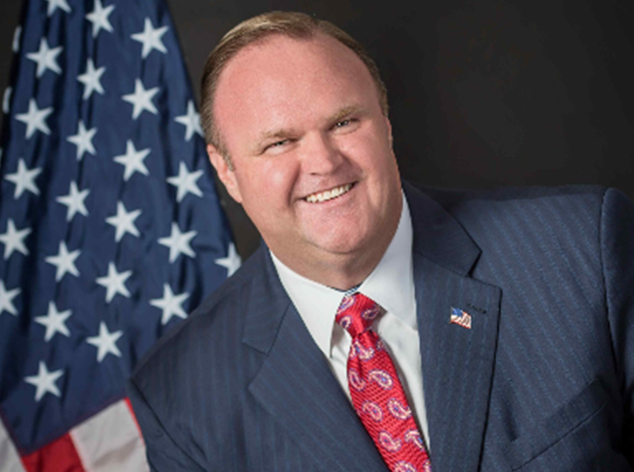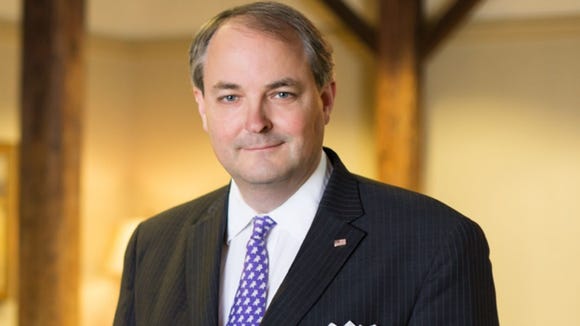Sandra Day O’Connor, who made history as the first woman on the Supreme Court, dies at 93

Ashley Murray, Alabama Reflector WASHINGTON — The first woman to serve on the nation’s highest court is dead at 93. Sandra Day O’Connor, a groundbreaking justice on the U.S. Supreme Court, died Friday in Phoenix, Arizona of complications related to advanced dementia, probably Alzheimer’s, and a respiratory illness, according to an announcement from the court. President Ronald Reagan nominated O’Connor in 1981, and she was confirmed by the full Senate, 99-0, in September of that year. The moderate O’Connor, who served on the bench until her retirement in 2006, was often the decisive vote in major cases that reached the Supreme Court in her nearly quarter-century as associate justice. The justices issued rulings in high-profile cases during O’Connor’s tenure, including Bush v. Gore, which settled the 2000 presidential contest in George W. Bush’s favor, and Planned Parenthood of Southeastern Pennsylvania v. Casey, a 5-4 decision that affirmed the constitutional right to an abortion but with leeway for states to impose some restrictions. O’Connor sided with the majority in both cases. “She was consequential,” journalist and historian Evan Thomas told the National Archives in 2019 while promoting his biography “First: Sandra Day O’Connor.” She cast the so-called “swing vote” 330 times in 24 years, Thomas said. “And where it really mattered was in abortion rights and affirmative action,” he said, referring to several cases, including Grutter v. Bullinger, which upheld the consideration of race in the University of Michigan’s law school admissions. In 2022, O’Connor’s successor, Justice Samuel Alito, wrote the majority opinion overturning Planned Parenthood v. Casey and Roe v. Wade, striking down abortion rights at the federal level. A ‘true public servant’ and ‘trailblazer’ Chief Justice John Roberts said in a statement Friday that O’Connor “blazed a historic trail as our Nation’s first female Justice.” “She met that challenge with undaunted determination, indisputable ability, and engaging candor. We at the Supreme Court mourn the loss of a beloved colleague, a fiercely independent defender of the rule of law, and an eloquent advocate for civics education. And we celebrate her enduring legacy as a true public servant and patriot,” he said. Senate Minority Leader Mitch McConnell of Kentucky said in a statement that the “nation mourns the passing of a towering figure in the history of American law.” “… From her election as the first female Majority Leader in the history of American legislatures to her confirmation as the first female Justice of the U.S. Supreme Court, Sandra Day O’Connor led with a brilliance and conviction that disarmed resistance. Her vote on the court frequently determined the majority in landmark cases, and the legacy of her role in landmark decisions reviving federalism during her first several terms on the Court continues to resound in Constitutional jurisprudence,” McConnell said. In the mid-1990s and 2000, O’Connor provided decisive votes in two 5-4 decisions that found federal laws unconstitutional under the Commerce Clause, including sections of the Violence Against Women Act and a federal law that criminalized carrying a firearm within 1,000 feet of schools. Senate Majority Leader Chuck Schumer of New York said O’Connor was the “conscience of the Court.” Schumer said in a statement issued Friday that O’Connor “was one of the true historic figures of the 20th century. In decision after decision, Sandra Day O’Connor was often the key vote in defending the rights of Americans—in protecting clean air, in protecting women’s rights, in protecting against discrimination, in protecting voting rights. I join Americans all across the country in mourning her passing today.” Speaker of the House Mike Johnson of Louisiana described O’Connor as a “trailblazer” and “legal giant” in a Friday morning post on X. “As the first woman to ever serve on the Supreme Court, Justice O’Connor inspired a generation of women — including the five female Justices that succeeded her — to chart a path that previously seemed unattainable,” he said. “Despite never serving as Chief Justice, she was widely regarded as the most powerful Justice on the bench during her tenure.” The women who followed O’Connor’s appointment to the court included Ruth Bader Ginsburg, nominated by former President Bill Clinton in 1993; Sonia Sotomayor and Elena Kagan in 2009 and 2010, both nominated by former President Barack Obama; Amy Coney Barrett, nominated by former President Donald Trump in 2020; and Ketanji Brown Jackson, nominated by President Joe Biden in 2022. Obama released a statement Friday recounting the well-known story of O’Connor’s challenges finding a job in the legal field as a woman in the 1950s, when she was asked about her typing skills and offered work as a legal secretary. “Fortunately for us, she set her sights a little higher – becoming the first woman to serve as a U.S. Supreme Court justice,” Obama said. “As a judge and Arizona legislator, a cancer survivor and child of the Texas plains, Sandra Day O’Connor was like the pilgrim in the poem she sometimes quoted – forging a new path and building a bridge behind her for all young women to follow. Michelle and I send our thoughts to Sandra’s family and everyone who learned from and admired her.” From the Southwest to the nation’s capital O’Connor was born on March 26, 1930, in El Paso, Texas, and grew up on a ranch in Arizona. She graduated near the top of her law school class at Stanford University in 1952. O’Connor began her law career as deputy county attorney of San Mateo County, California, followed by a position as a civilian attorney for Quartermaster Market Center, Frankfurt, Germany, from 1954 to 1957. O’Connor practiced law in Maryvale, Arizona, until 1960 and went on to serve as assistant attorney general of Arizona from 1965 to 1969. She followed her time in the attorney general’s office with multiple terms in the Arizona State Senate beginning in 1969 and eventually serving as the body’s majority leader. In 1975, she was elected as a Maricopa County Superior Court judge and served until 1979, when she was appointed to the Arizona Court
Steve Livingston elected new Senate Majority Leader, replacing Clay Scofield

On Monday, Senate President Pro Tempore Greg Reed (R-Jasper) announced that State Senator Steve Livingston (R-Scottsboro) had been elected the new Senate Majority Leader, replacing Sen. Clay Scofield (R-Guntersville), in a meeting of the Republican state senators. “The process of electing Senator Livingston was efficient and effective,” Reed said. “The Republican Caucus emerged with a united decision, and we look forward to continuing to lead Alabama toward guaranteeing the state is a better place to live, work, and raise a family. I am excited about the transformative work we are doing and the goals we will achieve throughout our third quadrennium of leadership.” Speaker of the House Nathaniel Ledbetter (R-Rainsville) congratulated Livingston on his election. “In addition to being one of my closest friends for many years, Steve Livingston has been a mentor of mine since the first moment I joined the House and a strong leader whose example I respect deeply,” said Ledbetter. “Sen. Livingston is a man of strong convictions and conservative beliefs, and he will lead his colleagues with the fairness, strength, and common sense that are his trademarks.” As was reported by Alabama Today, Sen. Scofield resigned from the Senate on Monday. “I have resigned from the Senate to become the Executive Vice President of the Business Council of Alabama,” Scofield wrote in a letter. This decision was one of the hardest that I have ever had to make, and with any decision of this magnitude, I involved a lot of prayer and talked it over with family and friends. If I didn’t love serving you, the decision would have been easy. It’s a dream job with an organization whose mission I strongly believe in. I have always supported policies that make Alabama more business-friendly because if we have healthy businesses, they can create more high-paying jobs. As President Ronald Reagan said: “I believe the best social program is a job.” This new job will allow me to continue my mission to make Alabama the most business/job-friendly state in the nation. “I also want to thank Senator Scofield for his unwavering dedication to the state of Alabama during his term as Majority Leader and tenure in the Alabama Senate,” Reed said. “After entering the Senate together nearly 14 years ago, Senator Scofield has proven himself to be an enduring friend, an exceptional leader, and a true champion for the people of Alabama. We wish Senator Scofield well in his future endeavors.” The Majority Leader is the second most powerful member of the Senate, behind the President Pro Tem. Next would be the Senate Rules Committee Chairman – Sen. Jabo Waggoner (R-Vestavia). Livingston represents Jackson, Dekalb, and Madison counties in the Alabama Senate, To connect with the author of this story or to comment, email brandonmreporter@gmail.com.
Gerrick Wilkins announces congressional bid

Last week, businessman Gerrick Wilkins announced he is running for Congress representing Alabama’s Sixth Congressional District. Wilkins is challenging incumbent Congressman Gary Palmer in the Republican primary. “It is with deep humility and responsibility that I enter the race for Alabama’s 6th District,” said Wilkins. “In 1964, Ronald Reagan said that our nation had reached a time of choosing; if that was true, then it is especially true today. Daily, we see the dysfunction in Washington, D.C., where career politicians have made the halls of Congress a lobbyist’s paradise. This must end. That is why I am supporting term limits for Congress and will work tirelessly to see that is enacted. Only with term limits will we be able to drain the swamp. Wilkins pledged if elected, he would be a true conservative and bring Alabama solutions and values to the U.S. House. “America is at a crossroads, and a strong conservative vision is needed to change the nation’s current trajectory and that he will be able to bring that vision to the House,” Wilkins said in a statement. Wilkins says that he is running as a strong fiscal conservative and supports a balanced budget amendment to the Constitution. Wilkins claimed that for too many, including Palmer, serving in Congress has become a way to make money and gain influence, not the citizen politician that the founding fathers envisioned and President Ronald Reagan advocated. Wilkins says he supports abolishing the federal Department of Education and returning its duties to the states and local communities, where education belongs. He also pledged to fight against “the woke indoctrination” and to be a staunch advocate for parental rights and school choice. “Education is supposed to unlock the potential of every child and put them on the path for a great future,” Wilkins said. “Sadly, our education system has become an indoctrination center for the far left and its woke agenda. That is why we must abolish the federal Department of Education, return education to the states and local communities, and allow parental choice in education decisions.” “Economically, the failed policies of Joe Biden and career politicians are bankrupting our nation and future,” Wilkins said. “This must end. That is why I am supporting a Balanced Budget Amendment. If families must balance their budget, so must the federal government.” Wilkins vowed to combat the leftist, woke agenda attacking our religious freedoms and trying to break down our families. “Together, we can bring commonsense Alabama values and solutions to Congress,” concluded Wilkins. “I pledge in Congress to be the representative of the 6th District and not D.C. insiders.” Wilkins is involved in his local church, serving as a deacon and lay leader, engaging in mission work locally and globally, and working with Gideons International. Wilkins says that he is a Christian who loves the Lord. Over the years, he has committed significant time and personal resources to missions and philanthropic work locally to help his community in Alabama and worldwide. Gerrick also serves on several local advisory boards, including one for Mission Increase and Samford University’s Brock School of Business. Wilkins and his wife, Carol, have donated hundreds of thousands of dollars to churches, various charities, mission organizations, and educational programs. Wilkins and Carol have been married for 24 years. They have one daughter, Hanna. They have lived in Alabama since 2006 and in Vestavia Hills since 2014. Wilkins has a bachelor’s degree from Pensacola Christian College. He also has a degree in theology from Liberty University and a master’s in business administration from Samford University. Wilkins has worked for over 24 years in the automotive industry. His experience includes managing large-scale dealerships and helping other community-based dealers grow. While managing car dealerships in Alabama, he has learned firsthand the constant heartaches small businesses must contend with from overregulation and excessive taxes. Ken McFeeters is also challenging Palmer in CD6. Palmer has served the people of Alabama in Congress for five terms. The primary will be on March 5. To connect with the author of this story or to comment, email brandonmreporter@gmail.com.
Heather Moore addresses Montgomery GOP

Heather Moore – the wife of Congressman Barry Moore (R-ALO4), was the keynote speaker on Thursday at the Montgomery County Republican Party’s annual Lincoln – Reagan dinner. Approximately 150 Republicans, including several dignitaries, were in attendance on the sixth floor of the RSA Plaza Building next to the Alabama State House for the annual event. “I love politics,” Heather said. “When Barry was in the State House, I would drive up for the day to watch the action on the floor and drive home before the kids got home.” Heather reminisced that once the State Legislature voted to extend unemployment benefits in the wake of the Great Recession, and one member of the House voted no on extending those benefits. Heather was sitting in the gallery with her friend, Bill Goolsby – who was also in attendance on Thursday. “Who is the one idiot who voted no?” Heather asked Goolsby. “That would be your husband,” Goolsby replied. Heather texted Barry, “You voted the wrong way,” but Barry could not be swayed from his stance. “That was the day that Barry was the one no vote to extend unemployment benefits.” Barry Moore has been an outspoken supporter of Jim Jordan (R-Ohio) as the next House Speaker. “Jim and Polly Jordan have become great friends,” Heather said. Bill Harris, Moore’s district director, said that Congressman Moore wanted to attend but could not because of the open Speaker of the House race and the possibility that there could have been a vote that night. Barry Moore is in his second term representing Alabama’s Second Congressional District. “We are $33 trillion in debt,” Rep. Barry Moore told the Montgomery GOP in a taped statement. “Inflation is up. Gas prices are rising.” Rep. Moore accused the Biden Administration of illegally giving “billions of dollars to Ukraine while 53% of Americans are living paycheck to paycheck.” Moore said that spending has soared since 1997 because Congress has failed to do its job by passing appropriations through normal order by using 12 spending bills. “The House has already passed several of these appropriations bills, but we are on a short notice to finish the rest and send them to the Senate,” Congressman Moore said. Moore said that Heather is “my favorite teammate of 31 years.” Harris said that Moore said of Heather, “She would have written my speech anyway, so I might as well send her.” Heather Moore grew up in the Sand Mountain area of Dekalb County. “I came from a very political family on my mother’s side,” Heather said, “My granddaddy was a farmer and a cotton broker. He was a Republican and a staunch supporter of Ronald Reagan.” “We are Appalachians, so we all live a quarter mile from each other, so my grandparents had a great role in my upbringing,” Heather said. “My dad’s side of the family were all yellow dog Democrats,” Heather said. “Staunch Republicans and the other side were yellow dog Democrats. I realized that the Republican side was always the happy side while the Democrat side was always mad.” “I was a huge Ronald Reagan fan,” Heather said. “I remember going to Donald Trump’s inauguration.” Heather Moore said that originally, she was not impressed with Barry Moore, but that position changed. “I did say that I would not go out with Barry Moore if he was the last man on Earth. I married him ten months later,” Mrs. Moore recounted. “We started our small business in Enterprise,” Heather said. “Barry never had any intention of getting involved in politics, but I did. I joined the Coffee County Republican Executive Committee.” Heather continued, “In 2006, some of our friends said your husband should run. Barry wouldn’t hear it. In 2008 (Barack) Obama was elected and said we are not a Christian nation, but a nation of citizens.” That is when Barry Moore became interested in running. He ran and was elected to the Alabama House of Representatives in 2010. “Barry is a horrible politician,” Heather said. “He is terrible at it. Barry is going to say what he believes. There is one Barry.” “Who thought three years ago that we could fall so far,” Heather said. “In 2020, Barry was running for Congress, and we thought Donald Trump was going to be President, and we were going to get so much done.” While Barry Moore was elected, Donald J. Trump was defeated by Joe Biden, and Republicans lost control of both Houses of Congress. The GOP gained limited control of the House of Representatives in 2022. “Barry is the eternal optimist,” Heather said. “He says that everything is going to be OK. I had to tell him, ‘No, Barry, things are not going to be OK.’” “It has been one crisis after another,” Heather said. “Back in the good ole days, it was Democrat versus Republicans. Now, it is not. It is normal versus crazy. It’s crazy versus normal. That is what we are having to fight as a nation.” Barry Moore’s Second Congressional District was recently redrawn along racial lines by a federal three-judge panel, making it highly likely that a Democrat will win Congressional District 2. The Moores’ Coffee County was drawn into Congressman Jerry Carl’s (R-Mobile) First Congressional District, potentially pitting the two GOP incumbents against each other. “The states have the right to choose their federal representative,” Heather said. “That is what the Constitution says. The Constitution of Alabama says that the Legislature draws those maps. I pray that Steve Marshall fights this all the way to the Supreme Court.” “He has loved every county in this district,” Heather said of Barry. “We represent every county. Barry has loved on every county, and some of those counties are Black.” “When you call our office, we don’t ask what color you are,” Heather said. “We don’t ask if you are a Republican or Democrat. We ask how can we help you.” “I don’t care what skin color my Congressman, or my President, is as long as they represent me with Republican values,” Heather said. “Read the Bible – read the Old Testament. There were evil kings in the Bible,” Heather said. “We are
John Hendrickson: Is former Vice President Mike Pence’s view on conservatism correct?

Former Vice President Mike Pence, in a speech before the New Hampshire Institute of Politics at Saint Anselm College and in an article in The Wall Street Journal, warned Republicans and conservatives about the danger of populism. The former Vice President argues, in echoing Ronald Reagan’s 1964 address, that it is “a time for choosing” for Republicans whether to continue to follow the “siren song” of populism or return to true conservatism. It is clear that Pence is not only drawing a line in the sand and forcing a debate over conservatism, but also distancing himself from former President Donald Trump and those who support his policies. Nevertheless, Pence fails to understand that the conservative populism he is denouncing is actually rooted within the American conservative tradition. Debates within and amongst conservatives is nothing new. The conservative movement contains various “schools of intellectual thought” over what conservatism means and how conservatives should shape public policy. Vice President Pence argues that the Republican Party must return to traditional conservatism. “If we are to defeat Joe Biden and turn America around, the GOP must be the party of limited government, free enterprise, fiscal responsibility and traditional values,” wrote Pence. Pence is defining traditional conservatism based upon the principles of limited government, free enterprise, fiscal responsibility, and traditional values. Further, he correctly notes that individual “rights come from God and nature, not from the state.” In addition, Pence argues that just “like our founders, we know the imperfect nature of men and women and that granting them unlimited power imperils liberty.” This is an important pillar of conservatism, that is, that human nature is flawed because of original sin. Pence is also correct in referencing the need for conservatives to uphold and defend constitutional principles such as federalism. Conservatives would largely agree with Pence’s definition of conservatism, but he only offers a surface view of conservatism. Pence warns about the danger of populism, and he argues that this is a political tool of progressives and he references William Jennings Bryan and the “Kingfish” Huey Long as examples. Further, Pence argues that populists within the Republican Party are a threat to limited government, traditional values, and even the Constitution. Further, these Republican populists favor abandoning “American leadership on the world stage” and “embracing a posture of appeasement in the face of rising threats to freedom.” Pence’s other indictment is that Republican populists are abandoning free enterprise. Is Pence correct that populism is not only wrong, but also rooted in liberalism and progressivism and that these Republican populists are not conservative? First, Pence needs to define what policies of the Trump administration were not conservative. Pence acknowledges that the Trump administration governed as conservatives, but now Trump has abandoned conservatism. Does this mean that the Trump America First agenda was conservative according to Pence? In 2016, President Trump campaigned on what was considered to be a new approach to conservatism. He called for restrictions on immigration, building a border wall to secure the border, a restrained foreign policy, and he was highly critical of free trade and openly called for tariffs to protect manufacturing. This agenda has been referred to as America First, conservative nationalism, and conservative populism. It also fits within the framework of the paleoconservative tradition. Nevertheless, the ideas that shaped President Trump were not new, nor were they a departure from conservatism as former Vice President Pence would suggest. In fact, President Trump was rediscovering an older conservative Republican tradition. As an example, Patrick J. Buchanan wrote that “in leading Republicans away from globalism to economic nationalism, Trump is not writing a new gospel. He is leading a lost party away from a modernist heresy – back to the Old-Time Religion.” Buchanan, during the 1990s, campaigned for the Republican nomination championing similar ideas as Trump. The conservative nationalist tradition can be traced back to the American founding. Specifically, Alexander Hamilton and the Federalists. President Calvin Coolidge even credited Hamilton and the Federalists and later the Whigs as the source of the Republican Party’s heritage. Former Vice President Pence should consider the conservatism of the 1920s. Conservatives such as Presidents Warren G. Harding and Calvin Coolidge not only challenged progressives, but their policy agenda was based on conservative nationalism. Harding and Coolidge not only supported a restrained foreign policy, but also protective tariffs and restricting immigration. They also placed an emphasis on limiting government by reducing spending, paying down the national debt, and reducing tax rates. Harding and Coolidge actually reduced government. Vice President Pence appears to be fighting against conservative nationalism and embracing the neoconservative agenda that was embraced by President George W. Bush’s administration. Neoconservatism and the Pence-style of conservatism dominated the Republican Party before Trump. What were the results: a full retreat on the cultural war and traditional values, engaging in costly wars to promote democracy, free trade agreements which led to the devastation of manufacturing, middle-class jobs, and massive trade deficits which led to the rise of China, and uncontrolled immigration. Plus, the federal government, along with the national debt, continued to grow. It was this “traditional” conservatism that idolized and worshiped at the golden alter of democracy and free trade. Is this the conservatism that we want to return to as a nation or a movement? In fact, during the first Republican presidential candidate debate Vice President Pence resembled former President George W. Bush more than President Ronald Reagan, especially in his advocacy of sending more dollars and support to Ukraine. This foreign policy approach, along with free trade, has more in common with progressives such as Presidents Woodrow Wilson and Franklin D. Roosevelt. Pence’s approach to Ukraine is Wilsonian. Pence is attempting to proclaim himself as the true heir to Reagan. When examining the legacy of President Reagan too many conservatives forget that Reagan, even with all of the free market and liberty rhetoric, often practiced a restrained foreign policy and implemented trade policies that were considered protectionist. Some even argued that Reagan was the most
Will Sellers: Nothing to lose?

To coincide with Independence Day, many foreign nationals will publicly renounce all loyalties to their country of origin, pledge their allegiance to the United States, and officially become U.S. citizens. Witnessing people from all walks of life and from every continent become citizens creates an infectious patriotism and offers a rare glimpse into the sacrifice others make to become Americans. In evaluating other countries, Ronald Reagan said that the acid test of a nation’s liberty and system of government is determined by the gate test. This test was a simple observation of a nation’s borders to see which side of the gate had a lock and armed guards. The test is pass-fail. If the country had guards to keep its citizens from getting out, then it fails the gate test, but a country that must guard to prevent people from getting in, passes. This test examines perceptions of future opportunity to determine which country would gain population if people were allowed to accept or reject citizenship based on a vote of their feet. There are some countries that people yearn to inhabit, and others they would leave immediately if they could. Almost since inception, the United States has received high marks on the gate test. But, the journey to citizenship is not easy. Without experiencing or observing the process, it is difficult to fully appreciate the sacrifices legal immigrants make for the privilege of being called Americans. In fact, 70 years ago this month, Lt. Franciszek Jarecki became a United States citizen. His path to citizenship required a literal act of Congress. Because he had defected from Poland and was a former member of the Polish Communist Party, he had to have a congressional dispensation. Unlike today, the Poland of Jercki’s era failed the gate test. Its people wanted to leave, but guards kept them in. Jarecki, though, was a pilot and had been trained to fly the state-of-the-art MiG-15. This high-performance aircraft was by all accounts the best jet fighter in the world. Allied pilots fighting in Korea took notice when this new aircraft was introduced into the conflict. The MiG’s advanced technology had aeronautical engineers scratching their heads. It was critical to acquire one of these planes to fully check out its design and determine its vulnerabilities. To this end, the CIA instigated Operation Moolah, which promised any MiG-15 pilot $50,000 upon defection and political asylum in America. And, to prove the genuineness of the proposal, the testimony of Lt. Jarecki appeared on leaflets that were dropped over North Korea, touting his warm welcome and acceptance. At the time of his defection, Jarecki was only 22 years old. He was an exceptional student, as only elite pilots were allowed to operate the MiG-15. But, in Poland at the time, the Soviet fist dominated everything, and the centuries-long antagonism between Russia and Poland was inescapable. Fences and guards held the people in, and any sense of freedom was extinguished by the Soviet puppet government in Warsaw. Keeping his own counsel, Jarecki shared his desire for freedom with no one. When his unit was moved closer to the Baltic Sea, a military briefing inadvertently revealed that the Danish island of Bornholm was a short distance from his base and contained a small landing strip. One morning while leading his patrol, he decided without much-advanced planning to make a run for freedom. Wanting it to appear that his plane was having mechanical issues while also getting under Soviet radar, he dropped his excess fuel tanks and made a severe dive without any communication with the other pilots on his patrol. Realizing that time was critical, Jarecki flew very low above the water but was noticed by another pilot and began to hear chatter on his radio that Soviet planes were being scrambled to stop him. He was able to avoid further detection and, in a matter of minutes, had landed his plane undamaged on Danish soil. His defection was risky as the consequences were severe. In fact, a few months before his flight to freedom, another Polish pilot had tried to defect but didn’t have an allied airfield as close. That pilot was caught, tried for treason, and without any due process or legal niceties, summarily executed. Jarecki knew the price was high. What he didn’t know was that his mother would be arrested and imprisoned because of her son’s defection—another gate test failure. Nevertheless, he succeeded and provided the West with the first completely intact MiG-15. Engineers from the United States were immediately dispatched to conduct a detailed examination of the plane, and Jarecki was on hand to explain the maneuverability from his pilot’s perspective. Once the aircraft was completely reviewed, photographed, and documented, it was returned to Poland by ship. Even though Denmark was a NATO member, its proximity to Russia and the Warsaw Pact countries was such a cause of worry that Danish officials felt returning the plane, even without the pilot, would serve as a goodwill gesture. Jarecki was treated as a hero, and the Free Polish government in London recognized his service with a medal. From London, he went to the United States, where he confirmed his status as a defector and supplied information about Soviet air capabilities, tactics, and his experience as a MiG pilot. While the United States compensated him and gave him asylum, he could not become a citizen. U.S. policy required anyone seeking citizenship to have been in the country for several years and precluded former communists from an easy path to naturalization. But there was an exception, and that was for Congress to pass an act specific to Jarecki, which effectively waived these requirements. Given the large Polish American population of his district, then-Congressman Gerald Ford sponsored the legislation to allow Jarecki to become an American. Seventy years ago, this act was passed, providing yet another example of how the United States passed the gate test with flying colors! Will Sellers is a graduate of Hillsdale College and an Associate Justice
Bill to prevent China from buying Alabama real estate passes House

On Tuesday, the Alabama House of Representatives passed legislation that would forbid Chinese citizens, Chinese businesses and corporations, and the Chinese Communist Party and government from being able to purchase land and other real property in the state of Alabama. House Bill 379 (HB379) is sponsored by House Majority Leader Scott Stadthagen. Stadthagen said, “They are the biggest threat to us.” The synopsis states, “Under existing law, an alien, whether resident or nonresident, may own, hold, or dispose of real property with the same rights as a native citizen. This bill would prohibit Chinese citizens, the Chinese government, or Chinese entities from acquiring title to real property in the state.” State Representative Mary Moore said they were not a problem until Ronald Reagan. “When President Reagan started encouraging our companies to go overseas,” Moore said. “That accounts for a lot of poverty, especially in southern Alabama and eastern Alabama because they were clothing manufacturers.” “The problem is bigger than the state of Alabama,” Moore said. “President Reagan loved China, and they became a superpower.” Stadthagen explained that if his bill passes, “They can’t purchase property in Alabama.” Rep. Jamie Kiel said, “Your bill protects the state from the communist Chinese.” “My district was also impacted by the great sucking sound of jobs leaving the country that Ross Perot talked about, and that was under President [Bill] Clinton in 1994 with NAFTA,” Kiel said. “President [Barack] Obama said that the relationship between the U.S. and China was the most important bilateral relationship in the world.” “Whoever started it, it is time to stop it, and I appreciate the bill,” Kiel said. Rep. Tracy Estes said, “For those who may think that the Chinese are not the greatest threat to this country, don’t be fooled.” Rep. Napoleon Bracy asked, “What prompted this?” Stadthagen explained, “In the last year, the Chinese have purchased over six billion dollars’ worth of property.” “This is a protection bill,” Stadthagen said. “I know of several real estate contracts that are in progress.” Bracy asked, “What if they are already here?” “Then they are already here,” Stadthagen answered. “What if they wanted to expand?” Bracy asked. “Then they have to get a citizen or a dual citizen to purchase that property, and they can lease it from them,” Stadthagen answered. Bracy asked, “Could this hurt the economy?” Stadthagen said that it had not in the other states that have done this, but admitted, “This is something that is fairly new.” Stadthagen said, “The Department of Commerce wants to talk to me about it before it goes upstairs to the Senate.” Bracy said that a Chinese corporation had bought piston engine manufacturer Continental Motors. “Continental is in Mobile,” Bracy said. “Are they the enemy? They are providing jobs to our citizens. They are providing over 300 jobs.” “If Continental Motors decides to leave and those 300 jobs and their $75 million investment leaves with them, then we are impacting a lot more people than what this was designed to impact,” Bracy said. Rep. Tim Wadsworth expressed concerns that the way this was written would also apply to Taiwan. “Taiwan is not a part of it,” Stadthagen said. “About 90% of the semiconductor chips in this country are made in Taiwan,” Wadsworth said. “China and the U.S. actually consider Taiwan to be one country as part of the one-China policy.” Rep. Sam Jones said, “Continental Motors was a U.S. Company that sold out to China. They have been in Mobile for over 50 years.” Jones said he had been on several international job recruiting trips as the Mayor of Mobile. “We weren’t recruiting politics – we were recruiting jobs and companies,” Jones said. “Do I support the communism in China? No, I don’t, but we are a world economy.” Stadthagen said, “Do you know how many acres of land are owned by other countries? 1.4 million acres in Alabama are owned by foreign countries.” Jones said, “Alabama exports surged to over $25 billion last year. Our two largest trading partners are Germany and China.” “We don’t handle foreign policy,” Jones said. “That is not what we do here. You don’t know the facts because you have never spent any time recruiting industries.” “We watch Florida and pass everything that they do down there,” Jones said. “I am surprised that we have not passed anything about Mickey Mouse yet. We follow Florida, but we aren’t Florida.” Rep. Neil Rafferty asked about Chinese people that have moved here seeking asylum. “They can lease a house or property while they work on their citizenship,” Stadthagen answered. Rafferty asked, “Why don’t we do this for Vietnam or Laos? They are communist.” “They are not a threat to us,” Stadthagen answered. Rafferty asked, “What other countries would you do this with? “North Korea and Iran,” Stadthagen answered. Rep. John Rogers said, “The federal government is the one who ought to be pulling the trigger on China.” “If China were to stop exporting all the stuff they make for us, we would be in a world of hurt,” Rogers said. “This concerns me because it seems to single out one particular race. I like Chinese food.” Rogers asked, “If China called in our debt, can we pay it?” Stadthagen answered, “We can’t.” Rogers said, “Can you imagine if we had a war with China? We will have to draft you.” Rep. Barbara Drummond said, “I am here standing for Mobile. Brookley is in my district, so I have seen this business grow. I have seen Brookley take off. They are contributing to our local economy. They are contributing to the Alabama economy. I know China is a communist country, and I know how they treat women, and I don’t like that.” Drummond said, “Our Chamber has red-flagged this for us and said that this is going to hurt.” Rep. Ben Robbins offered an amendment addressing members’ concerns. The amendment exempted companies already operating in the state and Taiwan from the legislation. Stadthagen accepted the amendment as friendly, and it was adopted in a 100 to 0 vote. SB379 passed the House in a
Senate Committee rejects effort to move Robert E. Lee holiday to October

On Wednesday, the Senate Fiscal Responsibility and Economic Development (FRED) Committee rejected a bill that would have moved the celebration of the Robert E. Lee holiday to the second Monday in October. The legislation would have moved the Robert E. Lee state holiday from its current position on the calendar – the same day as the Martin Luther King Jr. birthday holiday in January – to the Columbus Day holiday in October. Senate Bill 130 (SB130) was sponsored by State Senator Vivian Figures. “I brought this bipartisan bill two years ago along with the late Representative Steve McMillan,” Figures said. “We and Mississippi are the only two states that celebrate both of these men on the same day.” “We can’t move the Martin Luther King Holiday because it is a federal holiday,” Figures explained. “October was the time of his (Lee’s) death.” Figures said that Lee was indicted for treason by a grand jury, owned slaves, had slaves whipped, broke up slave families, and led an army that enslaved free Black people and killed African American federal troops who tried to surrender. Figures said that advancing her legislation would benefit the state’s image and boost the economy. A public hearing had been called on SB130, but the people asked to come to the Committee and speak against the bill were not present. The Committee voted not to give a favorable report to SB130 by a voice vote. Following the vote, Figures asked for a roll call vote. Chairman Garlan Gudger told Sen. Figures, “No, you may not.” “I want the record to show that the African-American women voted for the bill, and all of the White Republican men and the White Republican woman voted no,” Figures said. “I am disappointed, but I am not surprised,” Figures told reporters after the vote by the Committee. This is the third year the Legislature has refused to advance this legislation. Figures was not optimistic that the bill would pass next year. “I see the writing on the wall,” Figures said. “Somebody or something is putting pressure on them because even members I thought would support it didn’t.” Alabama Today asked why not move the holiday back a week so that King has a weekend and Lee has his own weekend closer to his actual birthday. “The state doesn’t want that – that costs money,” Figures said. “They don’t want another state employee holiday.” Alabama Today asked why not move it to June and celebrate it on the same days as Jefferson Davis’s birthday. “I wanted a day with a connection to Lee,” Figures said. “He died on October 12.” Figures was asked why not just eliminate the celebration of Robert E. Lee Day. “That definitely won’t pass,” Figures said. Lee, the former Commandant at the U.S. Military Academy at West Point and a veteran of the War with Mexico was a Colonel in the U.S. Army who resigned his commission when his native State of Virginia voted to secede from the Union. Lee then accepted a command as a general in the Confederate States of America in 1861. Lee would become a military history legend in command of the CSA’s Army of Northern Virginia. Following the Civil War, he was President of the College now known as Washington and Lee University. Lee has been admired by Americans, particularly Southerners, for over 150 years. Alabama has celebrated the life of the beloved Confederate General with a state holiday for over a hundred years. Martin Luther King was a Montgomery Pastor who was the acknowledged leader of the Montgomery Bus Boycott and the Civil Rights Movement. He led the voting rights march from Selma to Montgomery after the first march was beaten by State Troopers and the Birmingham civil rights protests while preaching non-violence. King is a winner of the Nobel Peace Prize and is noted for his speeches and writings, including “A Letter from a Birmingham Jail” and his “I Have a Dream Speech.” King was assassinated in Memphis in 1968. President Ronald Reagan signed the bill making King’s birthday a national holiday. When King’s birthday became a holiday, the Alabama Legislature moved the already existing Robert E. Lee holiday to the same day as the King holiday. Wednesday was the 12th legislative day of the 2023 Alabama Regular Legislative Session. To connect with the author of this story or to comment, email brandonmreporter@gmail.com.
Joe Biden issues second veto of his presidency on Clean Water Act regulation

President Joe Biden vetoed the second bill of his presidency on April 6, 2023. Biden vetoed H.J.Res.27, a joint resolution of disapproval under the terms of the Congressional Review Act (CRA) that sought to void an Environmental Protection Agency and Army Corps of Engineers rule from 2023 that specified “which bodies of water fall under the scope of the Clean Water Act and are thereby under federal jurisdiction and protected.” In his veto message, Biden said, “The resolution would leave Americans without a clear definition of ‘Waters of the United States’. The increased uncertainty caused by H.J. Res. 27 would threaten economic growth, including for agriculture, local economies, and downstream communities. […] The resolution would also negatively affect tens of millions of United States households that depend on healthy wetlands and streams.” Overriding a presidential veto requires a two-thirds majority vote in both chambers of Congress. The House of Representatives and Senate both initially passed the resolution by a simple majority. The House of Representatives voted 227-198 to approve the resolution on March 9, 2023. The Senate voted 53-43 to approve the resolution on March 29. Rep. Sam Graves (R-Mo.) introduced the resolution on February 2. President Ronald Reagan issued the most vetoes (87) of all presidents since 1981. Biden, with two vetoes, has issued the fewest. President Donald Trump issued the second-fewest vetoes (9) within this timeframe. Presidents have issued 2,586 vetoes in American history. Congress has overridden 112. President Franklin D. Roosevelt vetoed 635 bills, the most of any president. Presidents John Adams, Thomas Jefferson, John Q. Adams, William H. Harrison, Zachary Taylor, Millard Fillmore, and James A. Garfield did not issue any vetoes. Republished with the permission of The Center Square.
Daniel Sutter: Social Security insolvency

Social Security has been long viewed as untouchable in American politics. An aging population seemingly only further entrenches this. Yet cuts may be coming if Democrats and Republicans do not act today. Social Security’s potential insolvency would trigger benefit cuts. Here’s how Veronique de Rugy of the Mercatus Center describes it, “Failure to reform, in fact, means benefits will automatically get cut. … [W]hen the Trust Fund runs out of IOUs around 2033, Social Security benefits by law will be cut by about one-fifth.” To unpack this, let’s start with the structure of Social Security. The taxes funding Social Security, primarily the payroll tax, goes into a Trust Fund (technically two funds, but money can be shifted between them), from which benefits are paid. Any surplus is invested in U.S. Treasury securities. The program operates on a pay-as-you-go (PAYGO) basis instead of accumulating assets like a private pension. Today benefits slightly exceed tax revenues, so the Fund operates at an annual deficit. Thanks to earlier surpluses, the Fund has a balance of $2.6 trillion. The annual deficits are projected to grow over the next decade, and insolvency occurs when the balance is zero. The Social Security system’s trustees project this in 2035, while the Congressional Budget Office predicts 2032. Which year is correct is immaterial. The Antideficiency Act prohibits Federal agencies from spending funds they do not have. Social Security revenues are projected to be 80 percent of annual benefits at insolvency. This yields the 20 percent benefit cut. Yet the Social Security Act creates a legal entitlement to benefits. Insolvency will bring these two laws into conflict. The Congressional Research Service is unsure which law will take precedence. Warnings of impending cuts presume the Antideficiency Act will rule, so benefit cuts are not written in stone. Also, Congress could hike the payroll tax to avoid insolvency. Why does this matter? Economist Thomas Sowell says that the first lesson of economics is scarcity, while the first lesson of politics is to deny the first lesson of economics. Economists, I think, should be clear whether scarcity or rules and procedures force choices on us. Rules and procedures drive the feared benefit cuts, not scarcity. Scarcity means that the current 12.4 percent payroll tax is inadequate; either Social Security taxes must increase, benefits must be cut, or both. Will Social Security become unaffordable? Some commentators offer very scary projections, but here’s a straightforward approach. Our aging population is lowering the worker-to-retiree ratio, stressing our PAYGO program. This ratio exceeded three in the 1990s, currently stands at 2.8, and may eventually fall to two. Since a 12 percent payroll tax covered annual benefits with three workers per retiree, an 18 percent tax should fund current benefits with two. Careful calculations suggest a lower rate will suffice. The Congressional Research Service estimates that a 15.6 percent rate rising eventually to 16.7 percent will fund benefits. I do not favor any tax increase, but a four-percentage point increase will not cause economic ruin. Medicare is on weaker ground going forward, but I am only considering Social Security’s sustainability today. Social Security has problems making it poor public policy. Most significantly, PAYGO produces an atrocious rate of return compared to true pensions. According to one estimate, the average participant will get $698,000 in benefits for $698,000 in taxes. A better public pension plan should enable reform long-term. Social Security’s funding problem reflects a larger problem facing our nation. We want more from government than we are willing to pay for in taxes. This fiscal imbalance produces our ballooning national debt and traces back, I believe, to the partial Reagan Revolution. President [Ronald] Reagan wanted to cut government, both taxes and spending. Spending cuts proved unattainable, but tax cuts remained politically popular, so President Reagan proceeded with tax cuts culminating in the landmark 1986 tax overhaul. This locked in low taxes, which persist today. To sustain current Social Security benefits or Federal spending, Americans will have to pay more in taxes. I hope we choose less government and more freedom, but scarcity will force a choice soon. Daniel Sutter is the Charles G. Koch Professor of Economics with the Manuel H. Johnson Center for Political Economy at Troy University and host of Econversations on TrojanVision. The opinions expressed in this column are the author’s and do not necessarily reflect the views of Troy University.
Jim Zeigler: Jimmy Carter as President vs. as ex-President

After several hospital stays, former President Jimmy Carter has entered hospice care at his home in Plains, Georgia. Hospice is often (but not always) comfort care as a person is dying. Carter, 98, is an example of a person whom I can disagree with politically while liking and admiring him as a human – and in Carter’s case, as a Christian and Bible teacher. In the divisive world we live in, it has become rare for us to be able to think, “I disagree with him politically, but he is a fine person and does a lot of good.” My impression of Carter as President was – weakness. He was weak in responding to the radical Islamicists. He was weak in protecting Americans taken hostage. The radical Islamicists sensed his weakness. They kept American hostages imprisoned until the day Carter left office. As Ronald Reagan was being inaugurated as President to follow Carter, our hostages were being released. And he gave away the Panama Canal. As an ex-President, Carter did a world of good. He was a leader – and a pretty good carpenter – in Habitat for Humanity. Hundreds of formerly homeless are now in homes built in part by Jimmy and Rosalynn Carter. While an ex-President, he taught his popular Sunday School class in Plains, Georgia, for over 40 years. Jimmy Carter and wife Rosalynn (pronounced rose-a-lynn) were a model for marital integrity. They were married in 1946 – 76 years of marriage. Wow. Jimmy Carter is the longest-living former President. Historians will likely say that Jimmy Carter did more as a former President than any except former President John Quincy Adams, who served in Congress for years until his dying day. Please be in prayer for President Carter, his wife, his family, and all who have loved him in his long life on this earth. He lived an abundant life. Jim Zeigler is the retired State Auditor of Alabama.
Past U.S. presidents, VPs asked to recheck for classified docs

The National Archives has asked former U.S. presidents and vice presidents to recheck their personal records for any classified documents following the news that President Joe Biden and former Vice President Mike Pence had such documents in their possession, two people familiar with the matter said Thursday. The Archives sent a letter Thursday to representatives of former presidents and vice presidents extending back to Ronald Reagan to ensure compliance with the Presidential Records Act, according to the two people, who spoke on condition of anonymity because they were not authorized to speak about investigations. The act states that any records created or received by the president are the property of the U.S. government and will be managed by the archives at the end of the administration. The Archives sent the letter to representatives of former Presidents Donald Trump, Barack Obama, George W. Bush, Bill Clinton, George H.W. Bush, and Ronald Reagan, and former Vice Presidents Pence, Biden, Dick Cheney, Al Gore, and Dan Quayle, they said. The letter was first reported by CNN. Spokespeople for former presidents Trump, Obama, George W. Bush, and Clinton and former vice presidents Pence, Dick Cheney, Al Gore, and Dan Quayle did not immediately respond to requests for comment. Biden’s lawyers came across classified documents from his time as vice president in a locked cabinet as they were packing up an office he no longer uses in November. Since then, subsequent searches by the FBI and Biden’s lawyers have turned up more documents. Former Vice President Pence, too, this week, discovered documents and turned them in after saying previously he did not believe he had any. The White House did not immediately respond to a request for comment, but the searches by Biden’s attorneys and the FBI appear to fulfill the Archives’ request. The Archives had no comment. Handling of classified documents has been a problem off and on for decades, from presidents to Cabinet members and staff across multiple administrations stretching as far back as Jimmy Carter. But the issue has taken on greater significance since former President Donald Trump willfully retained classified material at his Florida estate, prompting the unprecedented FBI seizure of thousands of pages of records last year. Attorney General Merrick Garland appointed a special counsel to investigate Trump’s handling of the documents and also Biden’s. It turns out that officials from all levels of government discover they are in possession of classified material and turn it over to authorities at least several times a year, according to another person familiar with the matter who spoke on the condition of anonymity due to the sensitive nature of classified documents. Current and former officials involved in the handling of classified information say that while there are clear policies for how such information should be reviewed and stored, those policies are sometimes pushed aside at the highest levels. Teams of national security officials, secretaries, and military aides who share responsibility for keeping top-level executives informed — and the executives themselves — may bend the rules for convenience, expediency or sometimes simple carelessness. While much of the attention has been on classified information, the Presidential Records Act actually requires that, from the Reagan administration onward, all records must be transferred to the Archives regardless of classification. It’s against federal law to have classified documents at an unauthorized location, but it’s only a crime if it was done intentionally. Speaking Thursday at an unrelated news conference, FBI Director Christopher Wray said that though he could not discuss any specific ongoing investigation, “We have had for quite a number of years any number of mishandling investigations. That is, unfortunately, a regular part of our counterintelligence division’s and counterintelligence program’s work.” He said there was a need for people to be conscious of laws and rules governing the handling of classified information. “Those rules,” he said, “are there for a reason.” Republished with the permission of The Associated Press.


